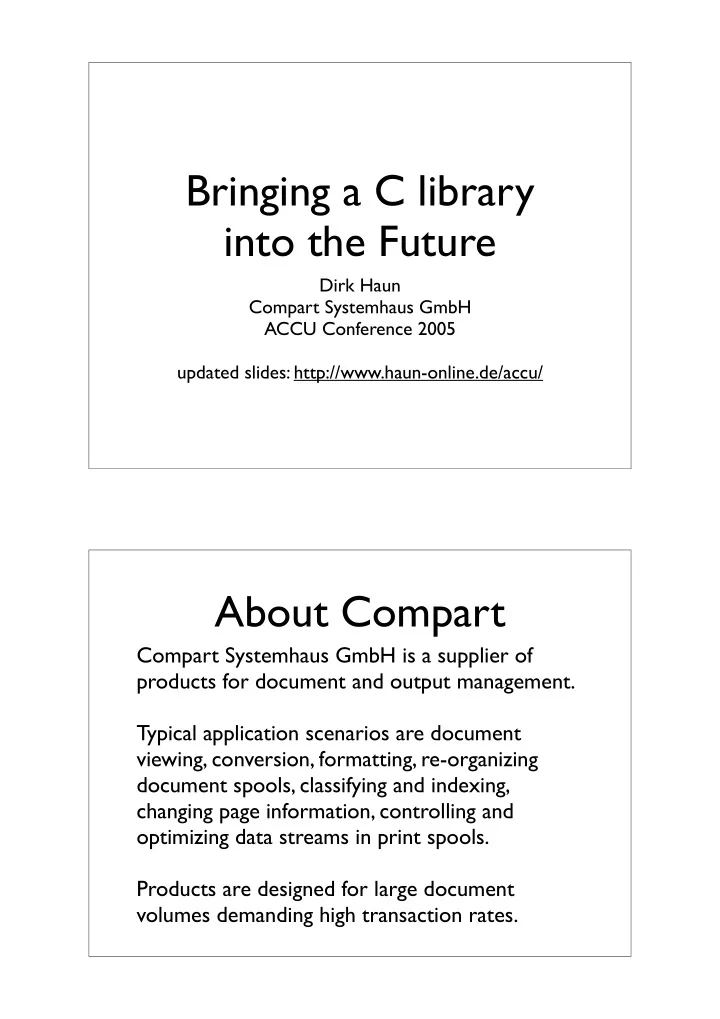

Bringing a C library into the Future Dirk Haun Compart Systemhaus GmbH ACCU Conference 2005 updated slides: http://www.haun-online.de/accu/ About Compart Compart Systemhaus GmbH is a supplier of products for document and output management. Typical application scenarios are document viewing, conversion, formatting, re-organizing document spools, classifying and indexing, changing page information, controlling and optimizing data streams in print spools. Products are designed for large document volumes demanding high transaction rates.
Motivation • Company knowledge (aka “IP”) accumulated in existing code • Tried and trusted code • Originally implemented in one language (in our case: in C, for speed and portability) • Need to use in other languages/ environments So what can we do?
Option #1: Rewrite A lot of work Possible introduction of bugs while porting Multiple code bases to maintain Possible performance impacts Allows for best possible native interface Option #2: Reuse Provide bindings Use of a code generator Overall faster to implement Development can continue on the original code - we only have to update the bindings Possibly not the best native interface
What we have Sample of existing code* PCPDOCPONENT pPage; DcpPageCreate(&pPage); DcpPageSetRotation(pPage, 90); DcpPageDestroy(pPage); * error handling left out
The concept Using an IDL • XML based Interface Definition Language • Describe methods and their parameters • Language-specific overrides / additions • Documentation
IDL: Functions <class name="DcpPage"> <function name="SetRotation" type="cprc" comment="Rotate page"> <parameterlist> <this/> <parameter name="Rotation" type="int" comment="Rotation, in degrees"/> </parameterlist> </function> </class> IDL: C’tor & D’tor <constructor> <parameterlist> <this/> </parameterlist> </constructor> <destructor> <parameterlist> <this/> </parameterlist> </destructor>
IDL: Types <extdeflist> <extdef key="length" name="Length" type="int" jtype="Length" ctype="PCPLENGTH"/> </extdeflist> ... <function ...> <parameterlist> <extref name="Height" type="length"/> IDL: Constants <constlist name="CPDOCPONENTTYPE" jname="Type"> <constitem name="Queue" type="int" value="0"/> <constitem name="Document" type="int" value="1"/> <constitem name="Sheet" type="int" value="2"/> <constitem name="Page" type="int" value="3"/> <constitem name="Omr" type="int" value="4"/> <constitem name="Barcode" type="int" value="5"/> </constlist>
IDL: Language-specifcs <snipplet pass=".jsi.c"> #include <cpbase.h> #include <cpdocpon.h> #include <jsapi.h> #include "jscputil.h" </snipplet> IDL: Documentation <doc pass=".jsi.c"> <description>Length constructor</description> <param name="pszValue"> <para>length string (value + unit)</para> </param> <return>new Length object</return> <example>length = new Length("2in");</example> </doc>
IDL: Miscelleanous • Primitive types are built in: int, boolean, string • Parameters can be marked “optional” • When the function takes ownership of an object, parameters have to be marked “keepref” to control garbage collection, e.g. Document.put(Page); An IDL example <?xml version="1.0" standalone="yes"?> <cpidl> <class name="DcpPage" jname="Page" baseclass="Docponent" package="compart.cplib.docponent"> <thisdef name="DcpPage" ctype="PCPDOCPONENT" type="int"/> <constructor> <parameterlist> <this/> </parameterlist> </constructor> <destructor> <parameterlist> <this/> </parameterlist> </destructor> <function name="SetRotation" type="cprc" comment="Rotate page"> <parameterlist> <this/> <parameter name="Rotation" type="int" comment="Rotation, in degrees"/> </parameterlist> </function> </class> </cpidl>
What we get JavaScript example page = new Page(); page.setRotation(90); delete page; // or garbage collection
C code for JavaScript JSBool Page_SetRotation(JSContext *cx, JSObject *obj, uintN argc, jsval *argv, jsval *rval) { JSBool result = JS_FALSE; CPRET CpRc = CP_OK; CPJSPRIVATEDATA *private = NULL; PCPDOCPONENT iDcpPage = NULL; CPSIZE_T iRotation = 0; CPINT iRotationArgv; for(EVER) { if(argc != 1) { CPJS_ThrowException(cx, "Expected 1 parameter but got %d.", argc); result = JS_FALSE; break; } private = (CPJSPRIVATEDATA*) JS_GetPrivate(cx, obj); iDcpPage = (PCPDOCPONENT) (private->pSelf); CPJS_GetArgumentAsInteger(cx, argv[0], "Page.SetRotation", 0, &iRotationArgv); iRotation = (CPSIZE_T) iRotationArgv; CpRc = DcpPageSetRotation(iDcpPage, iRotation); if(CpRc != CP_OK) { CPJS_ThrowException(cx, "Call to underlying cplib function failed with CpRc=%d", CpRc); result = JS_FALSE; break; } result = JS_TRUE; break; } return(result); } JNI code JNIEXPORT void JNICALL Java_compart_cplib_docponent_Page_j2cSetRotation � � � (JNIEnv *prmpJNIEnv, jclass prmjclass, jint jiDcpPage, jint jiRotation) { CPRET CpRc; /* declare native C vars - conversion of jni/c formal parameters */ PCPDOCPONENT iDcpPage=(PCPDOCPONENT)0; CPSIZE_T iRotation=(CPSIZE_T)0; UNUSED(prmjclass); // class object currently not used TrcEntry(TRCHOOK, ">Java_compart_cplib_docponent_Page_j2cSetRotation"); /* convert jni formal parameters to C variables */ iDcpPage = (PCPDOCPONENT)jiDcpPage; iRotation = (int)(jiRotation); /* invocation of native C function */ CpRc = DcpPageSetRotation(iDcpPage, iRotation); if(CpRc != CP_OK) { CPBOOL fException; /* check return code and conditionally throw exception */ /* go immediate to end on exeption (cleanup may dilluate exception stack) */ fException = CpjJNICBindingThrowException(prmpJNIEnv, CpRc, "DcpPageSetRotation"); if (fException) goto functionexit; } TrcExit(TRCHOOK, "<Java_compart_cplib_docponent_Page_j2cSetRotation"); functionexit: return; }
Java example /** * @param Rotation * Rotation, in degrees */ public void setRotation ( int Rotation ) throws compart.cplib.cjava.JCPLib.Exception { j2cSetRotation(this.cjavaHandle, Rotation); } Runtime reference js> p = new Page() [object Page] js> explain(p); Function replaceVars // Replace variables in stamp files 1: Vars jihVars; Function setRotation // Rotate page 1: int jiRotation; // Rotation, in degrees
Supported languages • Java (JNI + Java code) • JavaScript • Ruby • C • Definition files • DocBook Summary • Reuse of existing code - unchanged • Provides bindings for other languages • Generated automatically • Supports language-specific concepts
Looking back ... • A lot of effort went into getting the language concepts right • At least some of the interface definitions could be created with XSLT scripts Looking ahead ... • Support for other languages / environments, e.g. .NET • More control over the code generation • Cleanup of minor quirks • More generic code generation: Describe datastructures and create getter / setter methods
The End
Recommend
More recommend